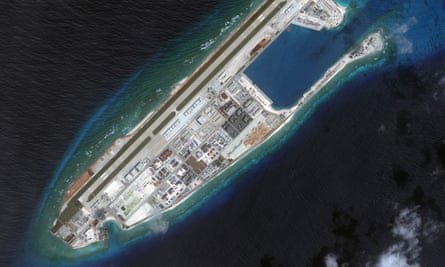
Australia has declared “there is no legal basis” to China’s territorial and maritime claims in the South China Sea, marking an escalation of recent tensions with Beijing and bringing Canberra further in line with Washington.
The declaration, made in a submission to the United Nations on Thursday, comes after the United States hardened its position earlier this month, accusing Beijing of a “completely unlawful … campaign of bullying” to control the sea.
Australia’s shift in position comes as Australia’s foreign affairs minister, Marise Payne, and the defence minister, Linda Reynolds, prepare to travel to Washington next week to meet with the US secretary of state, Mike Pompeo, and the secretary of defence, Mark Esper, for the 2020 Australia-United States Ministerial Consultations (Ausmin).
The declaration to the UN said: “Australia rejects China’s claim to ‘historic rights’ or ‘maritime rights and interests’ as established in the ‘long course of historical practice’ in the South China Sea.”
Australia’s declaration mentioned the objections and complaints held by the Philippines, Vietnam and Malaysia in regards to Beijing’s actions in the South China Sea, and “rejects” the validity of “land building activities” used to create artificial islands.
The declaration said Australia does not accept China’s claim of sovereignty over the Paracel Islands and Spratly Islands, after Australian warships encountered China’s navy near the Spratly Islands earlier this month when taking part in drills with Japan and the United States in the Philippine Sea.
It notes “the Tribunal in the 2016 South China Sea Arbitral Award found these claims to be inconsistent with UNCLOS (United Nations Convention on the Law of the Sea) and, to the extent of that inconsistency, invalid”.
“There is no legal basis for China to draw straight baselines connecting the outermost points of maritime features or ‘island groups’ in the South China Sea, including around the ‘Four Sha’ or ‘continental’ or ‘outlying’ archipelagos,” it said.
“Australia rejects any claims to internal waters, territorial sea, exclusive economic zone and continental shelf based on such straight baselines.
“Australia also rejects China’s claims to maritime zones generated by submerged features, or low-tide elevations in a manner inconsistent with UNCLOS. Land building activities or other forms of artificial transformation cannot change the classification of a feature under UNCLOS … the Australian government does not accept that artificially transformed features can ever acquire the status of an island.”
Earlier on Saturday, Payne and Reynolds said “discussions at Ausmin 2020 will centre on our shared efforts towards a stable, resilient, open, secure and prosperous Indo-Pacific, particularly in the context of the impact of Covid-19”.
“Our relationship is built on our shared values, and a shared understanding of the importance of maintaining presence and leadership in our region.
“In the face of an increasingly complex and contested regional environment, it is vital we continue working together across the breadth of our relationship.”
The joint statement also reiterated that “the United States remains by far Australia’s largest source of foreign investment”.
The ministers also wrote an opinion piece in Saturday’s the Australian newspaper noting “coercive actions in the South China Sea, such as the escalation of disputes and militarisation of disputed features, continue to create tensions that destabilises the region”.
The opposition leader, Anthony Albanese, said Australia needed to defend the “national interest” when asked about the change in position on Saturday morning.
“We also need to stand up for international law,” he said. “And the international law of the sea provides for freedom of navigation which is absolutely critical to international trade.”
Tensions between Australia and China escalated earlier this year as Canberra pushed for an inquiry into Beijing’s initial handling of the Covid-19 outbreak, with Australia’s trade minister, Simon Birmingham, complaining his Chinese counterpart would not answer his calls in May.
Since then, China has issued a warning to its citizens, and lucrative international student market, not to travel to Australia out of fears of racism. In June, Chinese foreign ministry spokesman Zhao Lijian accused Australia of mass espionage and of “stoking confrontation”.
Rising tensions have prompted Australian business leaders, who are worried further hostilities could damage exports to China, to call for a “separation of powers” between Australia’s foreign relations and trade ties.


No comments:
Post a Comment